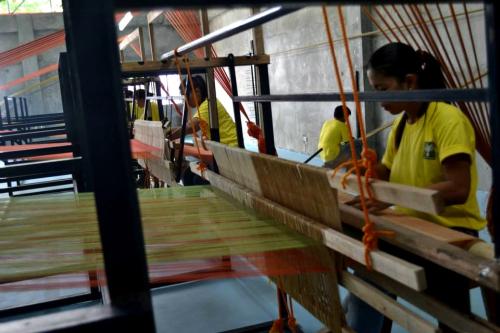
Loom weavers in Bohol will benefit from the Tubigon Loom Weaving Center’s new tools and equipment. (CDN PHOTO/AILEEN G. YAP)
To help weavers in Bohol be globally competitive and able to meet international demands, the Department of Trade and Industry (DTI) is investing P1.259 million to upgrade the Tubigon Loom Weaving Center (TLC).
The facility was re-launched last Friday with Trade Secretary Gregory Domingo as the guest of honor.
The facility is now equipped with 15 units of 4- and 2- harness metal-framed handlooms that allow the weavers to create 72-inch wide high-quality raffia fabrics; dyeing and drying tools; and edging machines.
“With these upgrades, the facility can produce woven products that are export-ready. The productivity is also enhanced to be able to compete in the global market,” said DTI Regional Director Asteria Caberte.
Before the upgrades, they were only producing 3,872 place mats and 484 rolls. Now they more than doubled the rolls to 1,210 rolls and 5,808 place mats every month.
These increased production translates to about P550,000 a month in income from only P266,000 in the past as prices of loom-woven products have increased to P75 per meter and the roll can be sold at an average of P200 per meter.
The expected increase in production will benefit the weavers in an area still recovering from the devastation brought about by the earthquake in October last year.
Caberte cited the expansion of the market of the Bohol weavers from Manila and Cebu exporters in the past to the US, Japanese and European markets.
“We were already visited by global brands like Issey Miyake and Hermes,” said Caberte.
The TLC was established in 1989 with 15 wooden handlooms that initially benefited 30 weavers.
Now there are 40 plant-based weavers, 81 home-based weavers, 74 raw material suppliers from Catigbian and Tubigon and five micro-enterprises benefiting from the facility.
“They would take turns each week to sustain their livelihood. The loom weaving industry in Tubigon has provided income opportunities to locals in the last 25 years,” Caberte said.
HISTORY
To help the industry grow further, the DTI has also partnered with the European Chamber of Commerce of the Philippines for a strategic market-oriented product development program done through the Materials Manipulation Project in 2011.
The project resulted in products combining raffia and other materials like paper and straw which garnered positive feedback from the market.
Seeing the potential of the Bohol loomweavers, the DTI implemented another project called the Bohol Loomweaving Development Program, where the DTI partnered with a French-owned weaving company, Cebu Interlace Weavers Corp., which taught the weavers other ways to combine raffia and reinvent it for the export market.
Caberte said that the new equipment in the facility is their way of ensuring that the raffia weaving industry in Bohol continues to thrive and grow despite the devastation.
Caberte said she hopes that Bohol will directly supply materials to more major global brands in the world in the near future.